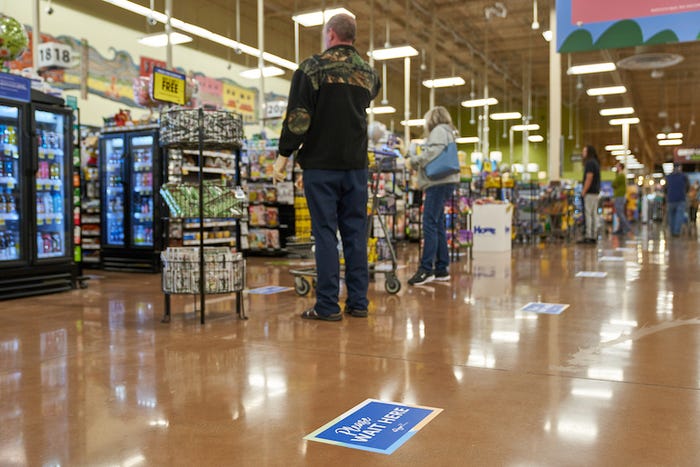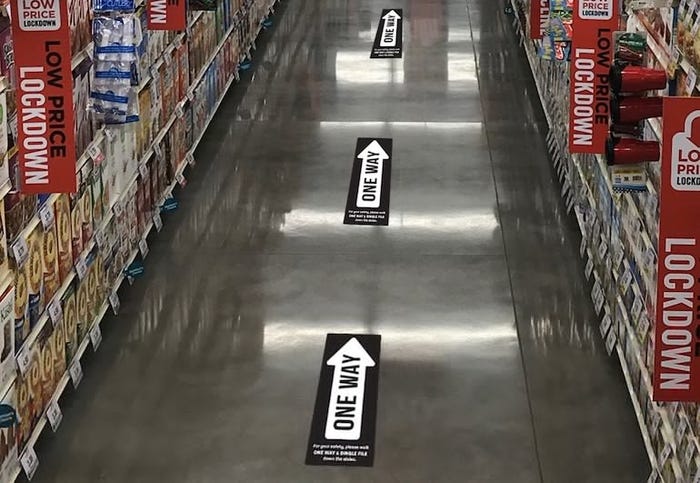UPDATE: Walmart, Kroger, Hy-Vee, Giant go with one-way aisles to combat coronavirusUPDATE: Walmart, Kroger, Hy-Vee, Giant go with one-way aisles to combat coronavirus
Meijer, BJ’s Wholesale Club also ramp up social distancing efforts
April 6, 2020

EDITOR'S NOTE: Article updated with informaton from Giant Food.
Walmart, The Kroger Co., Hy-Vee and Giant Food are instituting one-way aisles and limits on customer count in stores as grocery retailers nationwide augment initiatives to prevent the spread of novel coronavirus (COVID-19).
This week, Walmart started one-way movement through aisles at an undisclosed number of stores, with shoppers being guided by floor markers and direction from associates.
“We expect this to help more customers avoid coming into close contact with others as they shop,” Dacona Smith, executive vice president and chief operating officer at Walmart U.S., said in a blog post on the company’s latest social distancing measures.
“We’ll continue to put signage inside our stores to remind customers of the need to maintain social distancing, especially in lines,” he said. “And once customers check out, they will be directed to exit through a different door than they entered, which should help lessen the instances of people closely passing each other.”
Over the weekend, Walmart began limiting the number of customers who can be in a store at once. The Bentonville, Ark.-based retailer said stores will now allow no more than five customers for each 1,000 square feet at a time, or about 20% of a store’s capacity.
The new policy will work as follows: Associates will mark a queue at a single-entry door — in most cases the grocery entrance — and direct arriving customers there, where they will be admitted one by one and counted. Store staff and signage will remind shoppers of the importance of social distancing while they’re waiting to enter, particularly before it opens in the morning. And once a store reaches its capacity, customers will be admitted inside on a one-out/one-in basis.
“While many of our customers have been following the advice of the medical community regarding social distancing and safety, we have been concerned to still see some behaviors in our stores that put undue risk on our people,” Smith explained. “We want to encourage customers to bring the fewest number of people per family necessary to shop, allow for space with other customers while shopping, and practice social distancing while waiting in lines. We’re also seeing states and municipalities set varying policies regarding crowd control, which has created some confusion regarding shopping.”
Other efforts by Walmart to protect customer and employee health include temperature checks of employees, supplying of gloves and masks to associates who want them, installation of sneeze guards and social distance markers in stores, expanded paid-leave policies, and overnight closure of stores for cleaning and restocking.
“We know that in ordinary times a store is a gathering place for members of a community to connect and socialize. We look forward to the time when that is again the case,” added Smith. “However, we now want to prioritize health and safety by encouraging customers to do their shopping at a distance from others, then head home.”
On Monday, Kroger announced customer capacity limits to foster physical distancing in stores. Starting tomorrow April 7, the Cincinnati-based retailer said it will restrict the number of shoppers to 50% of the international building code’s calculated capacity. Kroger, too, said it has begun piloting one-way aisles in select markets to assess the concept’s effectiveness as a way to promote social distancing.

Kroger now will limit shopper capacity to one person per 120 square feet, compared with a grocery store’s standard building capacity of one person per 60 square feet.
“Kroger’s introduction of customer capacity limits is one more way we are doing our part to flatten the curve while operating as an essential business, providing our customers with access to fresh, affordable food and products,” stated Mary Ellen Adcock, senior vice president of operations for Kroger. “During this national pandemic, we are committed to adopting preventive measures to help protect the safety and health of our associates, customers and communities.”
Under the new capacity limits, Kroger will allow one person per 120 square feet, compared with a grocery store’s standard building capacity of one person per 60 square feet. The retailer said it will monitor the number of shoppers per square foot in stores using its QueVision technology, which counts customers entering and exiting stores.
“By leveraging QueVision, our technology system that uses infrared sensors and predictive analytics, we will be able to more efficiently support our new capacity limits, creating a safer environment for our customers and associates,” explained Yael Cosset, chief technology and digital officer at Kroger.
During the last few weeks, Kroger also has promoted physical distancing with the addition of plexiglass partitions at checkout, educational floor decals, and a “healthy habits” message on in-store radio that urges customers to exercise spatial awareness and good hygiene.
Kroger noted that it has increased measures to safeguard workers as well. Associates are being encouraged to wear face masks and gloves, and the company has ordered masks for employees nationwide, with supply starting to arrive in select regions and all locations expected to have a supply of protective gear by the end of this week.
Wellness checks also are under way. Kroger said it began testing employees’ temperature in its distribution centers several weeks ago and now is introducing expand associate temperature checks in stores. The temperature checks are in line with local ordinances, and associates can also request to have their temperature taken at work, the company said.
Meanwhile, West Des Moines, Iowa-based Hy-Vee enacted more social distancing measures this weekend. The Midwestern grocer started placing one-way directional signage in store aisles and plans to do so at all of its more than 265 stores. The signs help customers navigate aisles without having to pass each other, maintaining the federally recommended six feet of space.

This past weekend, Hy-Vee began deploying floor signage to create one-way aisles that enable customers to shop without having to pass one another.
And beginning today, customers at all Hy-Vee locations will be encouraged to follow a “one person per cart” rule to avoid multiple family members on one shopping trip. The retailer said customers should designate one person per family for grocery shopping to limit the number of people in stores at any given time.
All Hy-Vee stores also are installing more temporary window panels on the back of checkout stations to provide an additional layer of protection for cashiers and customers. Panels already are positioned on the front side of checkouts.
“We continue to implement additional ways to adapt at Hy-Vee so that we can serve our customers and protect the health and wellness of those who work and shop in our stores,” Hy-Vee Chairman and CEO Randy Edeker said in a statement.
Landover, Md.-based Giant, part of Ahold Delhaize USA, said that on April 7 shoppers will start seeing signs to direct one-way traffic flow. The Mid-Atlantic chain plans to implement the measure in all of its 163 stores. Arrow markers on the floor will designate traffic direction in aisles, and associates will be available to guide customers. In-store signage also will remind customers to observe six feet of distance from others.
In addition, beginning April 9, Giant said it will limit the number of shoppers to 20% of each store's overall capacity, taking into consideration shelving and display fixtures. Traffic flow will be tracked by an associate stationed at the front entrance. Signs, too, will be placed at front entrances to inform customers about the updated occupancy limits and request that they bring a few people to shop with them as possible.
"We are continuing to learn and adapt to the new ways of working during this challenging time and believe that these additional measures will allow us to further promote safe social distancing practices in our aisles to keep our customers and associates safe," Giant Interim President Ira Kress commented. "We will continue to look for ways to make shopping as safe and easy as possible to keep our doors open as we provide this essential service to our communities."
Meijer, BJ’s take action to increase customer spacing
Similarly, supercenter retailer Meijer has begun asking customers to limit the number of people who come to the store on each shopping trip. To that end, the Grand Rapids, Mich.-based chain is implementing processes to monitor the number of customers in our stores to ensure proper social distancing. The company noted that it recognizes some customers may need additional assistance and are unable to shop alone.
Starting April 12, Meijer also will temporarily suspend the weekly sales ad to help reduce the customer count inside stores. Other social distancing measures in effect include in-store signage and audio announcements, including floor decals six feet apart in areas where customers congregate, such as checkout and pharmacy and service desk counters; suggesting customers use the length of their shopping carts to gauge appropriate distance from others; and encouraging use of the contactless “express pay” when picking up prescriptions.
Meijer said it’s also completing installation of plexiglass shields at all check lanes and pharmacies in its 248 stores and conducting daily health screenings and temperatures checks of associates as they arrive at the store.
“We continue to look for additional ways to ensure the safety of our customers and team members in the face of this difficult challenge,” Meijer President and CEO Rick Keyes commented. “By working together, we can reduce the spread of this virus and help keep our communities safe.”
Westborough, Mass.-based BJ’s Wholesale Club on Saturday began limiting the number of members allowed inside clubs at one time. The warehouse club chain said shopper capacity will vary by location based on each store’s square footage, with no more than 20% of a club’s total capacity permitted in the building at a time. All members also are being urged to send only one person per household on each shopping trip.
Other new operational processes that BJ’s is implementing to promote social distancing include instructional signage throughout every club, audio announcements reminding shoppers to keep proper spacing, and dedicated associates to ensure customers don’t cluster when checking out.
In the coming weeks, BJ’s also plans to start check the temperatures of employees in all locations as they report to work. All staff will enter through the designated employee entrance, and any worker who registers an elevated temperature won’t be able to enter and will be directed to return home and seek medical care, if necessary, the company said. In addition, BJ’s will begin to make masks and gloves available, as supplies permit, to workers who want to wear them. All clubs, too, will be closed on Easter Sunday, April 12, for “a day to rest and recharge,” the retailer said.
“We deeply appreciate the hard work and dedication of our team members and we value the trust and confidence that our members have in us to provide them with essential services during this challenging time,” stated Lee Delaney, president and CEO of BJ’s. “We’ve implemented significant new protocols to help promote a healthy and safe environment for members and team members. We will continue to take precautions following guidelines and recommendations from health experts and relevant federal and state agencies.”
About the Author
You May Also Like





.webp?width=300&auto=webp&quality=80&disable=upscale)
